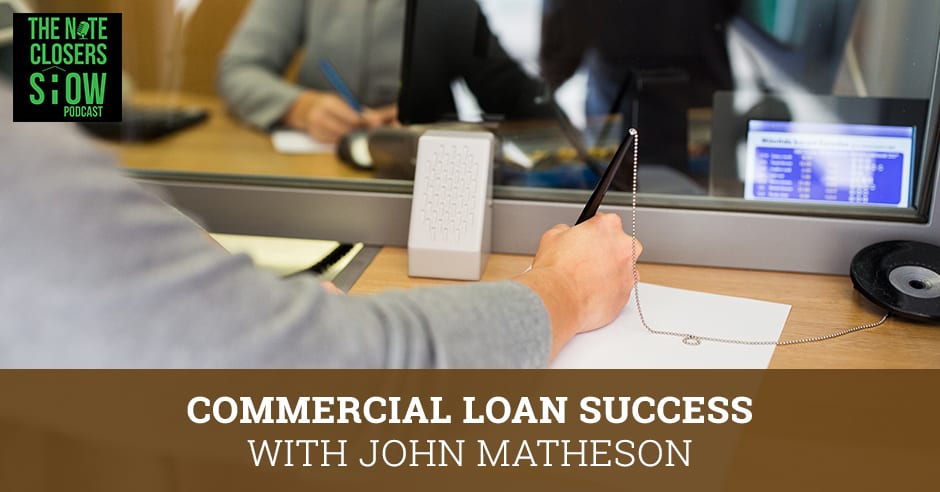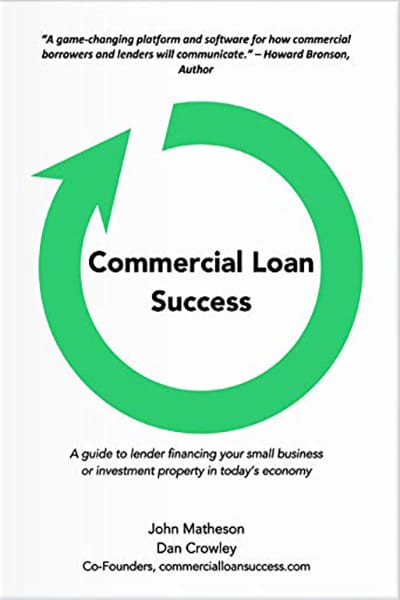
At any one point in our business, we sometimes have the need to look into commercial lending to help fund major capital expenditures or cover operational costs. Commercial real estate and financing expert John Matheson joins host Scott Carson to talk about the best ways to get approved for bank financing on commercial projects. John has a lot of investment experience and has helped finance over $50 million in projects. He has a loan-analyzing software called Commercial Loan Success system and a book of the same name which offers a step-by-step guide to predictably secure favorable lender financing when you need it.
—
Listen to the podcast here
Commercial Loan Success with John Matheson
I’m excited to be here but even more excited to have our special guest, John Matheson, from the CommercialLoanSuccess.com. He’s going to talk a little bit about some of the ups, the downs, the tricks and the tips when it comes to becoming or transitioning into commercial lending. John’s got quite a few years of investment experience and has helped finance over $50 million in projects. You’ve also got an amazing commercial loan analyzing software that you’re going to talk about a little bit here as well. Thank you first and foremost for joining us.
Thanks for having me on. This is terrific.
I’m glad and honored to have you. You’ve got such a great background. Why don’t we first start with that? Tell your backstory before we dive into stuff.
When you get to be my age, you guys will be able to tell there’s good and bad. The resume gets long. You look at my one sheet, you did such a nice job paraphrasing it. You start reading it, it’s like, “Have I been working that long?” I had to pay upon what level of maturation everybody is in their business from the start up to where I sit. I started like most people in the business. My background was I ended up with a finance degree and I went to work on that lovely little place called Wall Street. I was down there in the ‘80s when Reagan was in office.
Talk about a different world, Wild West and then you realize that it’s not going to be for you long-term. I left. In the early ‘90s, I went into real estate and when I did that, it’s the first recession of my career. I jumped in and I got trained, baptized by fire, for anyone who remembers the Resolution Trust Corporation era. You learn how to survive in those things differently than what may have happened for someone who’s new over the last few years who hasn’t seen that yet. As I project my career from now until then, I’ve been through three recessions. While I don’t want to come on your show and talk about how to get through the fourth but we have gotten through all three and our balance sheet has grown every year.
You learn along the way how as you get into commercial real estate, loan-to-value is important. The ability to properly use leverage to grow is essential. Wouldn’t we all like to be able to use cash all day to do transactions? Sometimes in your note business, you can’t but when you start getting into, “Let’s buy an apartment building for $2 million. Let me go out back and water that tree. It’s supposed to produce the money that I can use because you need it.” You start getting into situations where you learn how to navigate the space of commercial finance and private investor land. You have your elevator script and mine used to be nice and clean when we were doing our sustainable building and development business. When I’m in software, my wife says, “He’s a real estate developer and a software developer. He’s out of my hair all day.”
I’ve been a real estate investor since 2001. I got into fix and flips, wholesales, subject tos and started being a mortgage broker, doing commercial lending and then everything hit the fan in 2008. I jumped to the opposite side as I say the dark side of buying distressed debt. I was buying a lot of commercial notes from Capital One, Wells Fargo and some of the bigger guys out there and also some smaller funds and stuff like that too. These gurus are like, “Go get your feet wet in residential and then move into commercials when you grow up a little bit.” If people are getting to commercial space, it’s a whole different ball game than buying a single-family house or condo.
The first transaction that I did way back when was for $30,000 and it was great because you had the Land Academy people on. I bought a building lot and it was worth $60,000 at the time that I bought for $30,000. It was classic stuff that we both love to do. I went through a bank. The bank had the note which was on its side and your team works through and then I needed a builder. I had the good fortune in my career of working with my dad for a long time as the builder and I was the developer but this was pre him and me working together.
I found a builder and the builder puts up a nice little house on the property and we sold the house and split the profits. That’s when you start realizing builders do pretty well. I took the money and I went on to the next one. I bought two lots. It’s the same Bank, same situation, different development and then it starts to go from there but to level up, you start to realize that you need commercial banking in earnest. You need a credible source of financing with a fair rate. We can all go out into space and get the private capital at the double-digit rate if we have a bonafide transaction but you start to realize as you do more and more, that’s chewing into your profit margin and you’re doing all the work. You start to realize, “It’s commercial banking.”
I’m going to walk into a commercial bank with my transaction. Somewhere between trepidation for the most experienced person to absolute dread. We’re going to walk in and I’m going to get embarrassed, I’m going to get told no and they’re going to give me half of what I need. My deal is going to blow part. They’re not going to like my pro forma, my numbers, my balance sheet and my credit score. You will exclude it because we, as people, will do everything to avoid pain. It’s like, “I’m not going to go the bank route,” but what you realize is once you do and you get into it, that it’s nothing to be afraid of. It’s a process like everything else. The process is not as difficult as it sounds once you’ve done one. You have to start somewhere and like anything, you need to understand how it works and then you have to figure out how you fit in it. Tell me about your experience with commercial banks. You must have been somewhere in that world somewhere down the line.
When I was in JPMorgan Chase and the commercial banking side or also on the origination side dealing with a lot of others on a wholesale aspect, I always found commercial lending was easier than a single-family deal for the most part. The bank and the underwriting looked at the value of the property and the strength of the project. The borrower was important but it had less of an impact on the deal than the actual cashflow and the project.
When you and I break down CRE space, Commercial Real Estate, especially in a cashflowing deal, pretty much they look at three things on the transaction side. The first thing they look at is what’s the operating income minus expenses? What’s the NOI? They’re going to take that NOI and apply it to what they call a debt service coverage ratio. They normally want something that covers 1.25 over what the income is based on the principal interest payments you make annually. To simplify, if you have $10,000 that is going out the door, they want $12,500 coming in. To make it simple that way, then they’re going to look at some value for the property.
All of us developers are going to argue with them until we’re blue in the face over cap rate. Inside our software, we do a nice little funky dance with loan-to-value-driven pricing but the cap rate or some appraisal valuation is going to come onto the property. Ultimately, they’ll look at you and they’ll say, “Strength of sponsor, what’s there?” They are focused at the beginning on the transaction. Most people don’t realize that and you do because you’ve been in this space. The way to start a dialogue with a commercial banker is not to start talking about a lot of things but to talk about, “Here’s the NOI, here’s the coverage ratio, here’s the valuation that I came up with.” Then we can continue talking with the transaction. Once you do that, once the bankers are involved, the bankers will tend to help you with the rest of it. There’s somewhat we’ll call hair on the transaction. The roof’s got a little bit of an issue. It’s $20,000 and you think you’re done. Not really, not if the bankers are in it. They’ll help you. They’ll figure out ways to set aside that capital or escrow forward or do whatever they can typically to close the transaction once they’ve started it. The key is to get them started.

Commercial Lending: You need to understand how commercial lending works and then figure out how you fit in it.
Knowing those numbers and knowing things and not vetting on the best possible outcome. Being somewhere in the middle and being realistic.
We transition it into our software. You brought up 2008, 2009, what an unbelievable recession that was. The aftermath for it in commercial banking lasted for years and it’s barely corrected. If you think of it being years later, you would think we’d have a full correction and we still don’t. Any of the bankers that we talked to out there, you’re still into space where they feel they’re rejecting too many people. They’re turning down anywhere from four out of ten to six out of ten loans or they’re changing the terms and they’re saying, “You wanted this and we can give you this.” Most people in commercial borrowing land don’t understand why.
I’ll give you my funny story. I’ve got a deal pro forma in the construction side. I had come through for acquisition and development, owned the land and had entitled it. I had a ton of equity in it and was sitting in about 35% loan-to-value. I’ve got a typical two-year run with commercial bank maturities in June and it’s January. I clear at year-end and I call the banker. I’m like, “June is going to come and I’m not going to build it by then so I need an extension.” Normal developer speaks to the banker and normally it’s a one-pager and you get it. I get nothing back. A month later, I get a phone call and I get, “We’re merging and we’d like you to get this loan off our books and we know you can. Please do that for us. We’re not going to carry any acquisition development and construction pieces into the next deal.” I pick up the phone. This was a seven-digit loan. It wasn’t a small community bank deal. I start calling the normal suspects and everybody’s giving me this little lukewarm stuff, nobody’s jumping on this. I’m sitting here going, “I haven’t defaulted on a thing. What am I going to do here?” I call the banker and I’m like, “What happens if June comes and I don’t have this off your books? Are you going to at least give me more time?” They’re like, “We got to see.”
I start doing what any other good businessperson would do. I start networking to a resolution. I get some commercial realtors who refer me to this guy who they say, “This guy’s a bank consultant. He’ll help you out.” I called him and his voicemail’s full. I’m like, “What am I going to do?” I’m waiting for him to call back. I’m starting to Google. Have you ever Googled for a seven-digit loan? It’s like, “Upload your credit score, upload your financials.” I’m like, “I’m going to put my top-rated credits on the internet and what, you’re going to send me a few out?” No, hence the rise of FinTech, which solves a lot of problems. People in pain say, “Let me give the quickest solution. I’ll pay the higher rate and I’ll give you everything. Get me out of pain,” but it’s like, “There’s got to be a better way.”
This guy calls me back and he’s busy. He says, “I’ll meet you. Bring your financials on the transaction and we’ll meet.” He and I met at this diner. The two of us shouldn’t be at a diner at our age, eating bacon and sausage. We sit down and we’re going over the numbers on the transaction and he’s tapping away in his computer and he’s gone through and he said, “You’re a go.” I said, “What do you mean I’m a go?” He went, “I ran your transaction through my commercial loan analytic software and it vets your transaction against common bank guidelines and tells me if you’re likely to stop or go to the application.” I went, “What do you mean your software vetted me against common bank guidelines? What are the common bank guidelines?” He’s like, “What will happen is my software prints out a one-sheet piece of paper and I’ll send it to my contacts. You’ll have an LOI by Friday,” and that’s exactly what happened.
In the meantime, I’m sitting there and although I’m in acute pain with my transaction and worry and anxiety. We’ve all been there. I’m shifting to my entrepreneur hat and I went, “What does he have there that’s made me feel at ease? I want that. How do I get that software? He went, “I can’t give it to you. It’s on my computer.” I said, “What do you mean it’s in your computer?” He said, “I wrote the code. I did it. I used to be with the big money center bank. I left there and I went on my own. I’ve used this in my consultancy for many years. I vetted billions of dollars of commercial transactions for property and credit lines with this.” I said, “Do you realize the anxiety you took off of me by simply sitting in for five minutes and telling me I’m a go? You’ve empowered me to talk to banks with confidence. Do you realize what you did for me?” He went, “I get this all the time. People hug me.”
I couldn’t believe it though, Scott. I’m sitting there, I said, “Have you thought about putting this in the cloud and getting it out there? You relieved a ton of anxiety from me. I’m sure there are millions of people out there who feel the same way I do about commercial banking every time you go in.” He went, “It’s not what I do. I’m a consultant in this space and I haven’t gotten to that stuff.” I said to him, “I know how to do it. Would you like to partner?” From that moment, it’s the years of trial, tribulation, money in, test and redo that got us to what we have, which is an in the cloud-based software which lets you, me or anybody just sits there and do-it-yourself. Vet your transaction in five minutes or less and know before you apply if you qualify.
I’ll tell you the fun stories. We call them screeners and our screeners are for apartments and commercial buildings, which you could use on notes. You can use and it’s those departments, anything in cashflows and mixed use. We have the business lines of credit and an SBA loan. We get all people who use the software and I love the testimonials they say and I’ll share a few fun ones with you. A young man in his twenties and he’s doing his first transaction. He buys the software and the software is only $147. In he goes, he vets his transaction and prints out his one sheet and he does exactly what we tell him to do in our resource center. He walks into a bank and he sits down with somebody who is lending and he says, “I bought third-party software that vetted my transaction against common commercial bank guidelines and told me I’m a go. Would you like to continue the conversation with me?” and then he stops talking.
He’s handed the banker one piece of paper. The banker sits there, looks at it and says, “I’m sorry, could you give me one moment please?” He happened to walk into a branch where part of the commercial lending team was upstairs. The banker goes upstairs and brings downstairs the senior VP in charge of commercial lending who sits there and looks at this and says to him, “Where did you get this?” He says, “I bought it online.” He goes, “Not only would we like to continue the conversation with you but you are one of the most prepared borrowers to ever walk into this bank.”
This is early on in our beta testing. I get the call, he comes in and he says, “I should negotiate the rate. I want to go back in and put my feet on his desk.” I was like, “No, don’t. Whatever he gives you, you take as long as your numbers work and you can afford it in your deal because this is your first loan and that will lead to your second and your third,” and it’s what I did. You start with $50,000 to $100,000 then they give you $500,000 and then before you know it, you have $5 million. As long as you’re a responsible borrower with their money, you can use leverage and you know what that means in your note business. We know what it means in our commercial business. $1 million down in the right setting gets us a $5 million transaction and gets us into $10 million if we keep rolling profits forward. It’s not as far away as people think but you need the right tools.
I remember when the first cellphone came out. I mounted the cellphone in my Jeep on the stick and we didn’t have walk around phones back then. This is the early ‘90s and I was doing real estate transactions and we were building stuff. I remember being on that thing steady and I felt so productive and I came back to my office one day and I get my first cell phone bill, $1,400. I’m on it more now than I was then. That was the first bill and I remember paying that no problem. I was so happy to have that and you get tools like this where it’s like, “I can walk into a bank and I know I’m a go.” If the banker says I’m funny, what am I going to do? It’s the next bank. I don’t feel like it’s me. I’m rejected and I’m embarrassed. No, I’m a go. My transaction is good. It changes the conversation.
Imagine what happened to us coming through beta and then having things like that happen. All of a sudden, the bankers are calling us, “We want to meet your people who are wandering the street aimlessly with one sheet because they’re our ideal borrowers.” They’re prequalified. Banks tell us, “When we reject people, we feel terrible because we’re bankers, we’re community builders and we’re here to do business. We’re not here to say no but what happens to us is the borrower comes in unprepared or with unrealistic expectations,” and the software tends to set that in line. If your transaction’s not a go, a big stop comes up and then it will tell you recommended corrective action. Do you need more income? Do you need less expense in the deal? What I use it for a lot is to sanity check things. You’d love that in the note business. When I sanity check, I’m going to take this on and I’ve got it against the property. What if I’ve got a twenty-unit apartment complex? It looks like it’s covering at 1.65. I feel great.
What happens if I take away rent? I can do that and I take away rent. I’m down to 1.35. I take away two rents, I’m down to 1.1. I better look at that rent roll because it’s that sensitive of a building and people don’t realize that. What happens if the rate goes up as it has over the past year? I’m set to refi on a term in a few years. What happens if the rate goes up? How strong is my position? What happened to me as a commercial borrower that day? There are a lot of things that happened in 2008, 2009. People had to put money in because the bank came out and said, “Your property is not worth what we lent down into original. You’ve got to put in money.” You’re buying notes but you’re still looking at what’s the LTV? Where am I at in this property? What happens if there’s nonperformance? Is there any liquidity in it for me?

Commercial Lending: The Commercial Loan Success vets your transaction in five minutes or less and lets you know before you apply if you qualify.
The software lets you do all of that stuff. It’s like a fish finder. It does one thing well. It finds fish. It answers, “Is the first mortgage financeable?” I can geek out with it and I can find the bottom and how deep it is. If there’s no structure on the bottom, I can find out the water temperature. I can geek out in the software and sanity check myself all day but I dwell on it only because I get excited. These are tools that we didn’t have back when we started. It’s like these guys who play baseball. That first aluminum bat was a joke compared to what these guys have in college now. It’s like the sliding pants. I would’ve worn those every day because of injuries from sliding you’d get. Now they have all of it and you have all these tools that you can use in the market, which we have one of them but there are so many other tools you can use and look at what you do. All the education and teaching for people that weren’t there back years ago that you can take advantage of and it sets you up so much more for success than what I think we had.
The market has changed. We’ve had ups and downs. The commercial market hasn’t fully recovered in places because that was one of the biggest opportunities for us. We were getting commercial notes back several years ago or the value dropped 10% to 15%. The people that were borrowed against it, the banks wanted to bring in 10% to 20% in cash to bring down their LTV back to something they were comfortable with instead of being over-encumbered. That led to a lot of defaults on good properties. Do you think we’re going to see that again? I’m a big believer that we’re going to see another bit of a downturn. It’s not going to be as dramatic as it was years ago but we’re going to see something in the market correction of some sort.
It depends upon where anybody is in their business cycle. Downturns can be very productive for your business, especially for what you and I do. If you’re not exposed on a high loan-to-value and your loan to value is, pick a number, 10% to 15% correction. It doesn’t affect me if I’m 70% LTV. In banking land, what happens with regulations is they get under pressure to comply. You have to reappraise and they want to have 20% in. When you’re taking commercial bank money, you do have to be sensitive to what happens if things change and what’s your position in the transaction. If you’re doing any type of reduced LTV acquisition or you’re buying things that are fractionally available out there, you’re going to be in a position as survivor recession in a downturn.
What happens is, and you and I both know you have to wait for liquidity to return into the market to fund you if you have a good asset. The problem is knowing what’s a good asset. For me, you probably have the same thing. In my commercial real estate business, I have a five-page due diligence form and it started out as anything else, one page. Now, it even comes down to how many cellphone bars are on the property. You have so many little picky things and I’ll look at 100 things. I’m lucky if I do one because if you can’t survive my form and I discipline myself enough to where unless you can get everything right on my due diligence form, I won’t do it.
If you’re very active all day and you know how to prospect, you see hundreds of things come across your desk and if you do one and it’s a good one, it’s a home run. You tend to mature into that space. You have to get out there and start somewhere. You have to jump in and you have to try it. If you realize early on, “The cheapest place for money is the commercial bank.” You get within a couple of years at prime plus one. I’ve run around before at prime plus a quarter in different markets. Once they know you’re a good borrower and then they call you and they say, “I’ve got a deal on its side, are you interested?” It doesn’t take as long as people think to build those relationships with the institutions because I have to start and pay them back.
You’ve got to pass the smell test. You’ve got to look and know what you’re doing and what you’re saying. That’s the biggest thing. You don’t have to have the most amount of experience, especially in some projects if you’ve got a team or people that are part of the sponsors.
When I did my first apartment building, I had been a real estate developer but I hadn’t run an apartment building. When I did my first one, the banker said, “Who’s going to manage it?” I looked at him and said, “Give me five minutes. I’ll be right back.” I realized I couldn’t say me. What I did, I hired a property manager. The property manager did a nice write-up. I brought it in, handed it to the banker and said, “I’m hiring this person for 5% of the rental stream.” The banker said, “Great,” and they did the deal 80% LTV back then.
Where have you seen LTVs like that for the most part?
The software is preset at 75%. It tends to be the sweet spot of where they like to be. You can in certain places push to 80% or 85% but you have to be careful. There is that wonderful world of, I don’t want to say predatory lending again but I want to say liberal underwriting or aggressive lowering of interest rates to pull you in where there’s a reset provision that comes in a couple of years or five years. There is a lot of competition. The banks freely admit it. There’s a big push for deposits and it drives the engine. They’re looking for who has that and that can be difficult for all of us starting out. The second tier of your career, it can be hard to have all that stuff. It becomes a different world as you’re out there. Trying to get 85% LTV can be hard unless you have a lot in the bank but 75% is a good number. You should be able to do any transaction out there at that number that is a cashflowing property that will pass structural.
Are you seeing where the banks are allowing carrybacks and junior position by any chance?
It’s right in our software now and I tell them. People are so afraid to tell them. You sit there and it’s like, “I’ve got Aunt Mabel in the second.” You tell her what her terms are. I’m not paying her. She accrues at 8% and she gets paid at the sale and we put her right in the software. There are a private lender spot and an equity partner spot or maybe it’s somebody like you and I come in and they want our expertise. We’re at 12% second. If you can do a transaction, 75% LTV and you can afford a 6% commercial interest rate amortized over twenty years and you can afford to pay a 12% second. You and I are both in agreement, “Where is that deal? We’ll buy it.” If you can fit all that in and you can get our software to say it’s a go and you don’t want to do it, send it in.
Whether it’s simple mistakes, what are probably the top mistakes you’ve seen people making as they’re diving into the commercial?
I always say to any of them, we do a lot of mentoring. You get to be my age, you mentor. It’s all about due diligence. The commercial property transaction is no different than any other one except there are more moving parts and you create your due diligence list and you’ve got to be diligent to it. You’ve got to stay on it and you have to invest in yourself. You do have to put out a little money for the lawyer, for the building inspectors, the structural people and the consultants. I even go so far and this is me. I’ll hire my own MAI appraiser before I even let the bank appraiser on the property because that costs me $2,000 or $3,000 a transaction. Fight with that guy over value if you want to have your transaction ruined three-quarters of the way through and have the wrong valuation done. You learn by doing. An MAI, for people who may not know, is a commercial designation, it’s not a residential one and they’ll do a workup and now that guy defends it to the next one. It’s a lot easier to argue with me as the developer because I’m viewed as, “He wants it,” versus, “Here’s an MAI consultant. Good luck with him.”

Commercial Lending: The cheapest place for money is the commercial bank.
It also saves you time. If you’re thinking something and your numbers come back way off, you’re not wasting six months of energy trying to fight that aspect.
The flip side is when you’re doing bigger transactions, if we’re doing that $30,000 that I started with, I would never have done any of this. You sometimes have to let it rot but when you’re doing seven-figure transactions, you can be $10,000 to $20,000 in the due diligence and the deal doesn’t work. You don’t want to be around me that day but I’d rather lose that than $200,000 or more because I forced forward. The due diligence, the education piece and if you’re going to level up in this space, to get yourself into credible bank financing as fast as you can. Build the relationship. It’s prime plus a number. It’s affordable and it’s somebody that you can talk to and I’ll even use them sometimes as sanity check myself. It’s like, “How do you feel about it?” Nobody’s more conservative than the bank. You listen to them. Do you listen to them and do the deal? Probably not. You do it because you’re a commercial developer, you move forward and you don’t take no from everybody all the time but you do get input and smart ones will help you. Like anything, you network to where you find them. I’m sure you know several.
Networking is an important thing and I’m a big proponent too of trying to be focused on a lot of stuff. The thing that always drives me bonkers about real estate investors is that they try to be a jack of all trades, going to everything and trying to learn everything and then never pull the trigger on something. I’m like, “Find an asset class you like and understand it, do a deep dive into that and learn that before you try to go around the horn and try to learn everything else.”
That’s wonderful advice because you become an expert. We’re in a specialized world. You become an expert at what you do and then you become discernible in the market. Recognize you almost hit celebrity status in your local market if you’re an expert in certain things. You can pick things to become an expert. With all the information and the tools that are available, you can become one pretty quick compared to what we grew up with.
I can remember walking into banks talking about their commercial assets and they would not have anything online. They had a big three-ring binder. I went in and he pulled out a large three-ring binder, “Here’s all our distressed stuff and take a look.”
I’m in my twenties and I was doing real estate at the time. I was a licensed realtor and learning real estate. I’m working for one of those large companies and my first commercial transaction is a little plaza. It was a long time ago and it was $300,000. It was my first commercial loan. I had a wonderful woman who was my mentor. She was an older, wonderful woman who taught me everything about commercial real estate early on. We were in one of those offices where you had partition walls in the conference room and she was behind the other partition wall. If you said stuff in that conference room she didn’t like, she could hear you. The wall has ears. I’m sitting there and the banker, Steve, is sitting there representing a bank that everybody would know.
He’s saying to the borrower, the guy had 15% down and he wanted 25%, he goes, “You’re not going to be able to do this transaction.” The guy goes, “I’ve got my aunt who’s going to give me the other $30,000 that I need for 10% more.” “We have to seize in your aunt. We can’t do that and we’re not going to be able to do that. She’d have to sign on loan.” I’m sitting there going, “Steve, this doesn’t seem to make a lot of sense. The woman’s putting in money on a kid. I don’t know what I’m doing.” The buyer’s getting frustrated and he’s going to leave.
All of a sudden, everything goes silent in the conference room and this thunderous Oz-type voice comes from the other room and it says, these are words to live by, “At your bank.” I sat up in my chair and I looked at Steve and I said, “Is the wall right? Is it your bank?” “No, every single bank’s going to be the same.” I said, “If I can find another bank to do this deal by tomorrow, you’re buying drinks tomorrow night and I can stay out late.” I found a bank who would do it with the aunt’s money with the aunt not signing. What did I learn? It taught me about bank rejection that day. It’s like, “At your bank.” “You can’t do my transaction here, next,” and you start to learn. As an entrepreneur, you don’t take no anyway. You keep going and going and all of a sudden, you meet somebody who you can build the relationship with and that would be takeaway advice for anybody out there struggling to get into CRE space. Come up with due diligence and learn how to do it. There are plenty of books and plenty of stuff to read.
Learn from you, learn from guys like me, learn how to do it. Read our book, Commercial Loan Success. There are books out there you can get on how to get through. When my book came out, it was a number one new release on Amazon. The book people call me, they’re like, “Take a screenshot. This isn’t going to last,” which is true. My mother was so proud. Books like that and stuff that you do, you take that stuff and then build a relationship with credible financing and you’ll never look back in this business. You will grow year-over-year and if your LTVs are intact, you survive any recession. Frankly, that’s where your buy-in opportunities are in the downturn, at the bottom of it.
Where do you see the most amount of opportunities for people to have? I know apartments are always hot and multifamily is big but are there anything else out there that you’re seeing a lot of opportunities?
It seems like we do a lot of stuff for permits. We do a lot of permitting and entitlement stuff. It seems like the mixed-use product is getting a lot. There’s not a lot of publication but it seems like it’s a very popular play. There used to be the only mixed-use was downtown. We had the drug store with the Philip Marlowe office over the top of it right on Main Street. Now it’s getting out into the suburbs. If you and I can pull a commercial and a residential rent out of a property, it seems like a lot of people don’t understand that in developer investor land. How that works or how to expand a commercial property, add rents over the top if the zone allows it. It’s a lot easier to build vertically than horizontal. I love what the Land Academy had to say but you’re going to find mixed-use is a nice little alternative to some of those plazas or pieces of land that you can reposition. Repositioning those and adding that component is fun.
It started out west the concept and it moves east and then somewhere in the middle of the country, it converts along the way. We’re toward the end of the cycle and we all know it. It’s when you don’t get in for equity into the deals you get in for debt and you keep your LTVs intact and they’ll face a downturn. I don’t see it being. The contagion that will occur won’t be in the real estate market itself. It will be somewhere else and I don’t see it lasting the same way or affect us in the same way as that of 2008-2009 did, not in commercial property.
It would be more on the residential side.

Commercial Lending: We’re in a specialized world. Become an expert at what you do and then become discernible in the market.
If you and I own downtown office buildings, maybe those guys would tell us something different but for what we do out in the suburbs with this commercial, yes.
What’s the best way for people to buy your book that you were talking about? They can instantly Google it and look on Amazon for that. Is it still available?
Yeah, for $9, it’s something small. It’s Commercial Loan Success: A guide to lender financing your small business or investment property in today’s economy. You’ll find it right in Amazon and then our software, you can go to CommercialLoanSuccess.com. What we’ve got there is we’ve got videos for every single type of person. If you’re a property investor right through, if you’re a CPA, if you’re a banker, whoever you are, it’s right there for people to find. They can watch the video that’s for them. In the end, there’s a clickable link and it takes them to a nice discount for the software. We’ve got a free trial for 30 days. Try it out, take it for a test drive and sanity check a few of your transactions. If it works for you, you keep it.
What markets are you excited about? Would you mind talking about any of the markets that you’re looking into more?
From a CRE side, I haven’t made a rent yet I didn’t like. They come in all flavors. I love the vacant lots that we can entitle but that’s a different skill set and that takes a lot of different practice over time and understanding how to do that. At the end of these cycles, repositioning is always fun. When we get things in a down cycle, we’re going to try to buy things, the repositioning is cash out of pocket. That can be more tedious than where you can find the buy-in opportunities that you can reposition. I love that space. Any rents we can reposition, land that we can develop, self-storage and all of it that flows. You can’t get enough of it because the demand is there but do your demand study.
That’s the beautiful thing about self-storage is you can do that on a lot of different sides. It doesn’t need to be a true square lot and it’s pretty inexpensive to build compared to a lot of other things.
We’ve got them where we can do them with the solar panels on the roof in certain parts of the country and trying to figure out how to close that panel from hail. Up in the northeast, we can put a solar panel on the roof. We can almost run a net zero building with our HVAC, which means we can offer conditioned space for the same price as cold storage if we wanted to break into a new market where there seemingly was quite a bit of garden variety cold storage and then a nice crisp new building. You can compete a little bit with some of the bigger players with these little niche products. We love that stuff.
Are there any states or cities that you’re excited about as far as the physical markets or metroplexes?
Right where you are, when I was down in Dallas and my head was on the ball bearing. I’m driving along from the city heading south and all of a sudden, I’m getting into places where the farmlands are for sale. I’m like, “I’m in the path of progress.” It’s music to my ears.
That’s a huge nugget right there. Think about that. You’re talking about the path of progress. We’re talking one or two miles away from the city.
We’re talking to the planner about our mixed-use unit. We have a live-work product. It’s a townhouse with a home office on the first floor that you make legal through a zoning entitlement in residential development.
That’s going to be huge. We’d see more and more and we’ll lock the doors coming home, getting out of the bigger offices especially with the use of technology and not having to commute.
If you and I go to any townhouse community in the States, there’s an association dock. 9.9 out of 10 of them say you can’t run a business out of your house. What if you had a townhouse community where you could? We love that little thing and that permits on a couple of acres and you can get 20 to 30 units easy or more and you stack them. Places like Nashville are insane. Any of the metro centers that you can profile where you can get your hands-on co-star type data and look at it is good. The northeast up, we’re still in a not my backyard world but if I took you for a ride on Route 128 up in Boston, there are cranes everywhere.

Commercial Loan Success: A guide to lender financing your small business or investment property in today’s economy
For all of us out there, the good news is that concentric circles are growing. Where it consolidates back to the metro centers in the recessions, it’s growing out 40 to 100 square miles around some of the metro centers where the tertiary markets are starting to get play. You want to get your properties before the bigger guys wake up and say, “This is a pretty nice town.” There’s nothing happening in here. There’s nothing going on here. There is nothing to see. Ignore those 40 units going up there. It was a mistake.
We’ve seen that in Austin and they’ve talked about how looking at Austin is a big area. About 1.2 million people in the Metroplex and about two million total around the areas. If you look at Austin in several years, the center of it is going to be twenty miles west as they say.
There is a massive opportunity and the niche developer has plenty of space. The person who can go in and permit. That’s a different level of commercial real estate player but for any of us with buy-in opportunities, you start to look at if people are putting in plazas and things to service the population, what else is needed? That’s the wonderful thing about real estate. Once you know there’s a population, you can go through a pretty obvious checklist of things that are needed and then you can figure out how to put those tenants in your building or how to develop that little space and do it that way or how to buy the note for that building even better.
Buying a discounted note gives you a lot of equity to work with. Especially when the bank says, “You’ll buy our note, we’ll go ahead and carry that for you. We’ll move it from one side of the balance sheet to the other.” John, what’s the best way for people to reach out to you?
CommercialLoanSuccess.com. You watch those videos and it all leads you back to where you can contact my team and me. There’s a bunch of us in it. It’s a software company. It’s got a bunch of people around to serve you and resource centers to answer your questions.
Thank you so much for taking time out your busy schedule to join us here on the show.
This has been a ball. Thank you, Scott. I appreciate it.
Check out John’s book. Get on the website and check out the software. You’ve got 30 days to play around it and 30 days to run your deals through it to see if you can get that one-sheet approval. It’s also the flexibility to be able to massage your numbers or see what’s going on and what levels you need to be at and what things you need to look at to work or rework, do your due diligence and things like that. It’s well-worth it. Check it out and you will not be disappointed. Go out, take some action and we’ll see you all at the top.
Important Links:
- Land Academy
- Commercial Loan Success: A guide to lender financing your small business or investment property in today’s economy
- www.CommercialLoanSuccess.com
- www.NoteCAMP.live
About John Matheson


